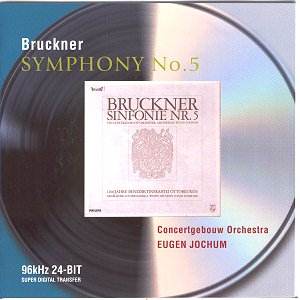Anton BRUCKNER
Symphony No. 5 in B flat major
 Concertgebouw Orchestra,
Amsterdam/Eugen Jochum
Concertgebouw Orchestra,
Amsterdam/Eugen Jochum
(Live recording from Ottobueren Abbey, Germany on 30 & 31 May 1964.)
 PHILIPS 50 464 693-2
[76.00]
PHILIPS 50 464 693-2
[76.00]
Crotchet
AmazonUK
AmazonUS

The Abbey of Ottobueren in Germany celebrated its 1200th anniversary
in 1964 and to mark the occasion Eugen Jochum and the Concertgebouw Orchestra
performed Bruckner's Fifth Symphony there with Philips on hand to record
them. The LP set arrived in the shops after Jochum had completed his
groundbreaking Bruckner cycle in the studio for DG so a new release of him
conducting just the Fifth seemed rather surplus to requirements and probably
counted against sales. As well as this, in addition to the two discs containing
the symphony, the box carried a third disc of a recital on the abbey's organ.
This might have further ruled the set out for reasons of expense. It was
certainly not available for very long. But many who heard the Bruckner remembered
something significantly different from Jochum's fine Bavarian Radio Orchestra
version on DG. In spite of balance problems on the LPs there was clearly
greater splendour of playing by one of the great Bruckner orchestras in something
of a golden age and the thrill of "live" performance in a near-ideal acoustic.
Albeit not one ideally rendered by the engineers, I have to say. Jochum would
go on to re-record all the numbered Bruckner symphonies for EMI in Dresden
years later, but this lone concert recording of the Fifth was always at the
back of many people's minds. History therefore appears to have had the last
word as it looks as though this will now go down in the catalogue as first
choice version for Jochum in this work in spite of another "live" recording
with the Concertgebouw made for broadcast in 1986.
Over the years Jochum's fundamental view of this symphony didn't really change
so I think the collector can be confident that overall here is Jochum's Bruckner
Fifth in its best official recording. No organ recital this time round,
of course, just the symphony in splendid isolation and remastered sound that
is superior to the way we heard it first on LP. Now the brass section is
more naturally contained and placed into the sound picture where before
they rather blew everything else away at the climaxes. And whilst still
benefiting from being in a church acoustic, surely the ideal setting for
this of all Bruckner's works, the impression this time is that the space
around the instruments is used much more discreetly. There is still effective
reverberation but it never gets in the way. Maybe the woodwind sound artificially
boosted, but these are such great players I don't think complaints are all
that appropriate.
For all that Jochum has the reputation of being a conductor who moulded and
shaped too much in Bruckner, in this work his guiding hand is quite benign.
The first movement has the right rock-solid momentum and what tempo adjustments
Jochum makes never seem to jar as they can in other Bruckner symphonies under
his baton. Indeed I think we can safely assume we are in touch with a performance
tradition stretching back to the composer's own time. For example, the way
he broadens slightly at the top of the first allegro following the great
fanfares has all the aplomb of a great actor in a slightly old-fashioned
production of Shakespeare. Then in the second movement I admired the delivery
of the crucial opening oboe solo. Too often the conductor's attention is
lavished more on the big string theme that comes a little later. But I know
I'm not alone in believing the oboe carries as important a message here,
maybe conveying Bruckner's lonely state of mind at the time of composition.
So this is a real example of a conductor's decision to take his time over
a passage paying great dividends. I also think it typical of Jochum that
he should cover every base like this especially since the arrival of the
big string theme itself brings such simple dignity and such dark timbre from
the Concertgebouw players. It's a test of Jochum's gifts in Bruckner that
he can maintain our interest so well throughout this movement. Maybe the
recording shows its age from time to time but there is no denying the quality
of the playing or the finesse of the hand directing it.
In the third movement Jochum is more aware than many of the need and the
rewards of contrasting the scherzo and the trio. In the former there is
relentless energy and weight, in the latter lots of earthy character and
upper-Austrian colour. But it's in the finale that any performance of this
symphony is going to be made or broken. This is Bruckner's greatest last
movement with its big fugue and grand chorale and the latter benefits greatly
from that church acoustic, as you would expect. Some might find Jochum's
speeding-up prior to the chorale's arrival a little excessive. I think it
prepares the ground admirably so that you find you are more than ready when
it confronts you. From here on, Jochum's mastery of his material carries
all before him with a near-perfect blend of intelligence and excitement.
Listen especially to the magnificent brass in the closing pages. Only the
greatest of orchestras can produce playing like this at the end of an evening.
A classic recording rightly restored to the catalogue in good sound and an
example of Jochum's Bruckner at its best.
Tony Duggan

